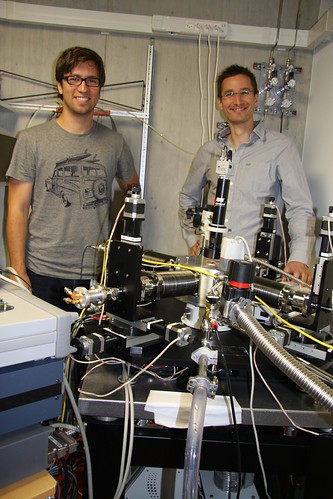 |
Kaes and Krebs working in the
Binnig and Rohrer Nanotech Center
at IBM Research (left to right) |
Several years ago the
European Commission created the Marie Skłodowska-Curie
Actions (MSCA). It set aside €6.16 billion to last through 2020 to support the
research training and career development of 25,000 European researchers – whether
they are early PhD candidates or seasoned scientists. The goal is to encourage
trans-national and interdisciplinary mobility across member and partner
countries, and for scientists to exchange ideas which lead to innovation.
One of these candidates
is Matthias Kaes, a pre-doctorial student
from RWTH Aachen
University in Western
Germany. For the past eight months, Matthias has been working side-by-side with scientists at IBM Research-Zurich on the cleverly
titled project called DIASPORA or Drift In Amorphous Semiconductors – A
Partnership of Rüschlikon and Aachen (Rüschlikon is the Zurich suburb where
IBM is located). The collaborative project is focused on the emerging field
of phase change materials, a promising
class of materials which are expected to be the basis for new generation of
fast and durable memory to handle Big Data and cloud computing workflows.
As Matthias’ time at IBM winds down to make room for other students joining from Aachen, we had a chance to
ask him, and the lead scientist on the project Dr. Daniel Krebs about the experience.
What motivated you to
apply for MSCA?
Daniel: As an alumnus
of Aachen, we
have very good connections to the phase change materials team who are doing
some impressive and complementary work to our research. But we didn’t
collaborate on a concrete project, so the MSCA call gave us the chance to
formalize a project, with dedicated resources, to investigate some critical basic
science which has been vexing phase change materials scientists since the
1970s. I was personally also motivated by the opportunity to interact with
young minds and to exchange ideas, which is the goal of the MSCA.
What did you know
about IBM Research prior to joining the team here? Any surprises?
Matthias: Of course I
knew about the Nobel Prize research and the invention of the scanning tunneling microscope, which
led to the atomic force microscope. But I was very surprised about the other
research conducted here, including computer security. I was also surprised to
learn about the large number of PhD students, I didn’t think this was possible
at an industrial lab.
Tell us more about your
experience so far?
Matthias: A typical
day is spent in the lab where I am setting up a variety of experiments, testing,
calibrating and characterizing the phase change materials under
different conditions. I also participate in weekly team meetings with our
co-workers in Aachen.
One of the goals of
the MSCA is your personal development. Do you have any examples?
Matthias: It may come
across as strange, but I have noticed that compared to my time at the
university I am taking a lot more notes. We have weekly cadence calls with the
other students, both here and in Aachen, and for these calls I need to update the
team on my progress. Therefore, since I am presenting more than before, I
obviously need to prepare with shorter deadlines. I find this a good "best
practice" for my career.
In addition, the research here is more focused. For
example, I am working with one experimental set-up, compared to several in Aachen. This is enabling
me to find a niche to focus on in more detail.
Based on your
experience, how do you think about a career in academic or industrial research?
Matthias: I had the feeling before I arrived that I didn’t want to stay in academia, so
this experience has reinforced my initial thinking. My experience has also
opened my eyes to the level of pressure for results at an industrial lab. It’s
too early to know where I will go, but I would like to at least initially start
at an industrial lab once I finish my PhD.
Since you are the
first of several students from Aachen
joining IBM what tips can you offer?
Matthias: Well, you
should be prepared to have patience finding a flat – demand far exceeds supply!
But one thing that has really helped me to meet people and to feel comfortable
in my temporary home was to join the IBM football team, which is sponsored by
the lab’s Hobby Club. It was good to meet colleagues outside of work and to meet
scientists from the other IBM departments. So my best advice would be to take
advantage of this.
Labels: Aachen, academia, IBM Research - Zurich, PCM, phase change memory

